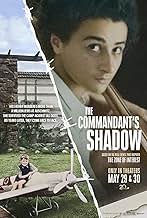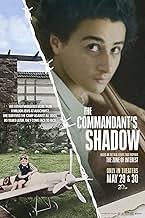Der Film begleitet Hans Jürgen Höss, den Sohn von Rudolf Höss, dem Lagerkommandanten von Auschwitz, bei der Auseinandersetzung mit der Beteiligung seines Vaters an der Ermordung von über ein... Alles lesenDer Film begleitet Hans Jürgen Höss, den Sohn von Rudolf Höss, dem Lagerkommandanten von Auschwitz, bei der Auseinandersetzung mit der Beteiligung seines Vaters an der Ermordung von über einer Million Juden während des Holocausts.Der Film begleitet Hans Jürgen Höss, den Sohn von Rudolf Höss, dem Lagerkommandanten von Auschwitz, bei der Auseinandersetzung mit der Beteiligung seines Vaters an der Ermordung von über einer Million Juden während des Holocausts.
- Regie
- Drehbuch
- Hauptbesetzung
- Auszeichnungen
- 2 Nominierungen insgesamt
- Self
- (as Hans Jurgen Höss)
- Self
- (Archivfilmmaterial)
- Self
- (Archivfilmmaterial)
- Höss' Autobiography read by
- (Synchronisation)
Empfohlene Bewertungen
The commandant and his family are the same ones portrayed in The Zone of Interest (2023), a gorgeous tour de force of filmmaking with surprisingly little to say, and in which rather little happens. (The lives of the Höss family did not get really interesting until after liberation.) That film was constructed on the premise that the phrase, "banality of evil" encapsulates some major insight about the Holocaust. Actually, evil's toxicity, seductiveness and delusion have more to do than its "banality" does. The two films taken together leave a far more lasting impression than either one can do separately.
A couple of key details need elucidation: It is not mentioned that Rudolf Höss was brought up to be a Catholic priest. Almost certainly, while he was on the lam in '45 and '46, he could have availed himself of the Catholic priest network that trafficked Adolf Eichmann and Josef Mengele to South America. Instead, he seemed reconciled and at peace with it being inappropriate for him to go on living.
Also, Rudolf's daughter, Püppi, had been a successful fashion model, married an American, became a US citizen, and held good retail ladies' wear jobs in her later years. Hedwig's death and interment happened in the US. Their family saga would make an interesting movie, resembling Unsere wunderbaren Jahre (2020).
He obviously has a child's memory of the camp, recalls his father as a loving parent, and considers his childhood a happy one. Pressed by his own son, Kai, he says he didn't know what was going on over the garden wall. Kai asks if he's repressed his memories out of self-defence. The old man doubts this, but it's difficult to believe that he hasn't. He seems to have spent most of his life avoiding questions about his father. Frankly, I don't blame him.
Hans is also reunited with his older sister, now living in America (and who, for unexplained reasons, he's not met for more than fifty years). She is equally certain that she didn't know the truth at the time, and doesn't want to talk about it now. Confronted directly, she finds it very hard to say a bad word about either of her parents - though it's notable that her mother's grave (she died in 1989) just says "Mutti" (German for Mummy). The Hoess name is absent.
A second strand of this film concerns Anita Lasker-Wallfisch, now ninety-eight but still with sharp wits. She survived Auschwitz because she was wanted for the camp orchestra. She's remarkably stoic, and discusses the past reluctantly, and with a lack of passion. Her daughter Maya, however, is a restless soul who wants to know about the family history. Though born and brought up in Britain, she wants to move "back" to Germany - even though her parents' home town is now in Poland. She also visits a memorial to her grandparents (and others).
It's significant that it's the younger generation - Kai and Maya - who feel a need to learn the truth, whilst the older generation needs to have it teased from them.
At the end of the film, Hans and Anita meet. It's strangely anti-climactic. But then, what could either of them say? What could anyone say?
Are the sins - and the sufferings - of the parents to be visited on their descendants? It seems that here they are. It's been eighty years, but World War Two hasn't yet claimed its last victim.
Wusstest du schon
- Zitate
Hans-Jürgen Höss: I don't think my mother was really in the loop. She probably had some hazy knowledge. But i'm sure she didn't know any details.
Top-Auswahl
Details
Box Office
- Weltweiter Bruttoertrag
- 24.417 $
- Laufzeit1 Stunde 43 Minuten
- Farbe
Zu dieser Seite beitragen

























